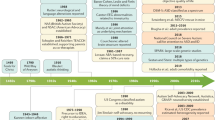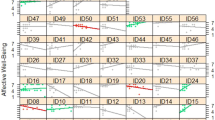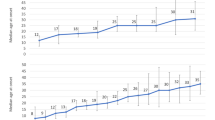Abstract
Background
Public health policies attempt to increase parental identification of child overweight and obesity. The objective of the present research was to determine the cross-sectional, prospective and longitudinal associations between parental identification of child overweight and child mental health problems.
Methods
We made use of two cohort studies of Australian (Longitudinal Study of Australian Children, LSAC) and Irish children (Growing up in Ireland Study, GUI) that measured parental identification of child overweight and child mental health problems. Participant included 6502 (LSAC) and 7503 (GUI) children (49% female) and their parents. Child mental health problems were measured using child, parent and teacher-reported Strengths and Difficulties Questionnaires (SDQ) at ages 9/10 years old to 12/13 years old. In all analyses we controlled for child Z-BMI.
Results
In LSAC children whose parents identified them as being overweight at age 10 experienced worse mental health at age 10 (β = 0.21, SE = 0.04) and age 12 (β = 0.13, SE = 0.04) than children whose parents failed to identify them as overweight. In GUI children whose parents identified them as being overweight at age 9 experienced worse mental health at age 9 (β = 0.20, SE = 0.04) and age 13 (β = 0.22, SE = 0.04). In LSAC parental identification of child overweight at age 10 did not significantly predict changes in mental health problems from age 10 to 12 (β = −0.02, SE = 0.03). In GUI parental identification of child overweight was predictive of increases in mental health problems from age 9 to 13 (β = 0.08, SE = 0.03).
Conclusions
Parental identification of child overweight and obesity is associated with worse child mental health, independent of child body weight. Parents should be aware of the potential stigma and mental health difficulties associated with labelling a child as overweight.
This is a preview of subscription content, access via your institution
Access options
Subscribe to this journal
Receive 12 print issues and online access
$259.00 per year
only $21.58 per issue
Buy this article
- Purchase on Springer Link
- Instant access to full article PDF
Prices may be subject to local taxes which are calculated during checkout
Similar content being viewed by others
References
de Onis M, Blossner M, Borghi E. Global prevalence and trends of overweight and obesity among preschool children. Am J Clin Nutr. 2010;92:1257–64.
Flegal KM, Carroll MD, Kuczmarski RJ, Johnson CL. Overweight and obesity in the United States: prevalence and trends, 1960-1994. Int J Obes Rel Metabol Disord. 1998;22:39–47.
Luppino FS, de Wit LM, Bouvy PF, et al. Overweight, obesity, and depression: a systematic review and meta-analysis of longitudinal studies. Arch General Psychiatry. 2010;67:220–9.
Patalay P, Hardman CA. Comorbidity, codevelopment, and temporal associations between body mass index and internalizing symptoms from early childhood to adolescence. JAMA Psychiatry. 2019;76:721–9.
Kvaavik E, Tell GS, Klepp K-I. Predictors and tracking of body mass index from adolescence into adulthood: follow-up of 18 to 20 years in the Oslo Youth Study. Arc Pediatrics Adolesc Med. 2003;157:1212–8.
Simmonds M, Llewellyn A, Owen C, Woolacott N. Predicting adult obesity from childhood obesity: a systematic review and meta‐analysis. Obes Rev. 2016;17:95–107.
Wang YC, McPherson K, Marsh T, Gortmaker SL, Brown M. Health and economic burden of the projected obesity trends in the USA and the UK. The Lancet. 2011;378:815–25.
Lobstein T, Baur L, Uauy R. Obesity in children and young people: a crisis in public health. Obes Rev. 2004;5:4–85.
Robinson E. Overweight but unseen: a review of the underestimation of weight status and a visual normalization theory. Obes Rev. 2017;18:1200–9.
Lundahl A, Kidwell KM, Nelson TD. Parental underestimates of child weight: a meta-analysis. Pediatrics. 2014;133:e689–703.
Carnell S, Edwards C, Croker H, Boniface D, Wardle J. Parental perceptions of overweight in 3–5 y olds. Int J Obes. 2005;29:353–5.
Duncan DT. Parental misperception of their child’s weight status: clinical implications for obesity prevention and control. Obesity. 2011;19:2293–2293.
Duncan DT, Hansen AR, Wang W, Yan F, Zhang J. Change in misperception of childas body weight among parents of American Preschool Children. Childhood Obesity. 2015;11:384–93.
Falconer CL, Park MH, Croker H, et al. The benefits and harms of providing parents with weight feedback as part of the national child measurement programme: a prospective cohort study. BMC Public Health. 2014;14:549.
Grimmett C, Croker H, Carnell S, Wardle J. Telling parents their child’s weight status: psychological impact of a weight-screening program. Pediatrics. 2008;122:e682–688.
Thompson JW, Card-Higginson P. Arkansas’ experience: statewide surveillance and parental information on the child obesity epidemic. Pediatrics. 2009;124:S73–82.
Evans EW, Sonneville KR. BMI report cards: will they pass or fail in the fight against pediatric obesity? Current Opin Pediatrics. 2009;21:431–6.
Ikeda JP, Crawford PB, Woodward-Lopez G. BMI screening in schools: helpful or harmful. Health Education Res. 2006;21:761–9.
Thompson HR, Madsen KA. The report card on BMI report cards. Current Obes Rep. 2017;6:163–7.
Park MH, Falconer CL, Croker H, et al. Predictors of health-related behaviour change in parents of overweight children in England. Prev Med. 2014;62:20–24.
Sylvetsky-Meni AC, Gillepsie SE, Hardy T, Welsh JA. The impact of parents categorization of their own weight and their childs weight on healthy lifestyle promoting beliefs and practices. J Obes. 2015;2015:7.
Parkinson KN, Reilly JJ, Basterfield L, et al. Mothers’ perceptions of child weight status and the subsequent weight gain of their children: a population-based longitudinal study. Int J Obes. 2017;41:801.
Gerards SM, Gubbels JS, Dagnelie PC, et al. Parental perception of child’s weight status and subsequent BMIz change: the KOALA birth cohort study. BMC Public Health. 2014;14:291.
Robinson E, Sutin AR. Parental perception of weight status and weight gain across childhood. Pediatrics. 2016:e20153957.
Min J, Wang VHC, Xue H, Mi J, Wang Y. Maternal perception of child overweight status and its association with weight-related parenting practices, their children’s health behaviours and weight change in China. Public Health Nutrition. 2017;20:2096–103.
Robinson E, Sutin AR. Parents’ perceptions of their children as overweight and children’s weight concerns and weight gain. Psychol Sci. 2017;28:320–9.
Berge JM, Trofholz A, Fong S, Blue L, Neumark-Sztainer D. A qualitative analysis of parents’ perceptions of weight talk and weight teasing in the home environments of diverse low-income children. Body Image. 2015;15:8–15.
Neumark-Sztainer D, Bauer KW, Friend S, Hannan PJ, Story M, Berge JM. Family weight talk and dieting: how much do they matter for body dissatisfaction and disordered eating behaviors in adolescent girls? J Adolesc Health. 2010;47:270–6.
Gillison FB, Lorenc AB, Sleddens EFC, Williams SL, Atkinson L. Can it be harmful for parents to talk to their child about their weight? A meta-analysis. Prev Med. 2016;93:135–46.
Madowitz J, Knatz S, Maginot T, Crow SJ, Boutelle KNTeasing. depression and unhealthy weight control behaviour in obese children. Pediatric Obes. 2012;7:446–52.
Growing up in Australia, Longitudinal Study of Australian Children. http://www.growingupinaustralia.gov.au/pubs/technical/tp1.pdf. Accessed 13 Sep 19.
Goodman R. The strengths and difficulties questionnaire: a research note. J Child Psychol Psychiatry. 1997;38:581–6.
Davis E, Sawyer MG, Lo SK, Priest N, Wake M. Socioeconomic risk factors for mental health problems in 4–5-year-old children: Australian population study. Acad Pediatrics. 2010;10:41–47.
Muris P, Meesters C, Eijkelenboom A, Vincken M. The self-report version of the strengths and difficulties questionnaire: its psychometric properties in 8- to 13-year-old non-clinical children. Brit J Clin Psychology. 2004;43:437–48.
De Los Reyes A, Thomas SA, Goodman KL, Kundey SM. Principles underlying the use of multiple informants’ reports. Ann Rev Clin Psychol. 2013;9:123–49.
Must A, Anderson SE. Body mass index in children and adolescents: considerations for population-based applications. Int J Obes. 2013;30:590–4.
Lobstein TJ, James WPT, Cole TJ. Increasing levels of excess weight among children in England. Int J Obes. 2003;27:1136–8.
Kessler RC, Barker PR, Colpe LJ, et al. Screening for serious mental illness in the general population. Arch Gen Psychiatry. 2003;60:184–9.
Growing Up In Ireland. http://www.growingup.ie/fileadmin/user_upload/documents/Technical_Reports/DIPR_Template_05.10.2010.pdf. Accessed 01 Aug 2019.
Radloff LS. The CES-D scale: a self-report depression scale for research in the general population. Appl Psychol Meas. 1977;1:385–401.
Haynes A, Kersbergen I, Sutin A, Daly M, Robinson E. Does perceived overweight increase risk of depressive symptoms and suicidality beyond objective weight status? A systematic review and meta-analysis. Clin Psychol Rev. 2019:101753.
Puhl RM, Latner JD. Stigma, obesity, and the health of the nation’s children. Psychol Bull. 2007;133:557.
Author information
Authors and Affiliations
Contributions
All authors conceived and designed the study. MD and AS analysed the data. ER drafted the manuscript. All authors revised the manuscript, contributed to the intellectual content and approved the final version. All authors are accountable for the accuracy and integrity of the work.
Corresponding author
Ethics declarations
Conflict of interest
MD and AR report no conflict of interests. ER has previously received funding from Unilever and the American Beverage Association, but does not consider this to be a conflict of interest for the present work.
Additional information
Publisher’s note Springer Nature remains neutral with regard to jurisdictional claims in published maps and institutional affiliations.
Supplementary information
Rights and permissions
About this article
Cite this article
Robinson, E., Daly, M. & Sutin, A. Association of parental identification of child overweight and mental health problems during childhood. Int J Obes 44, 1928–1935 (2020). https://doi.org/10.1038/s41366-020-0587-6
Received:
Revised:
Accepted:
Published:
Issue Date:
DOI: https://doi.org/10.1038/s41366-020-0587-6



